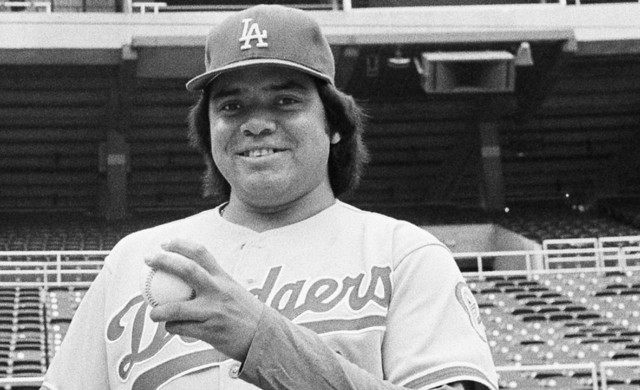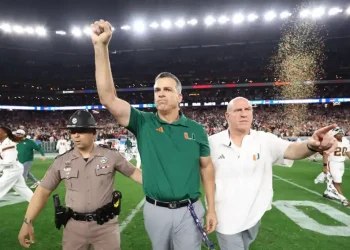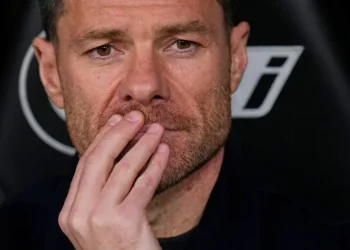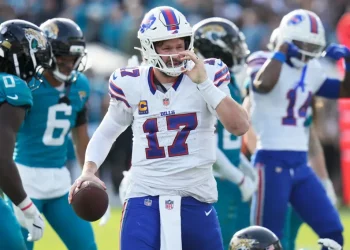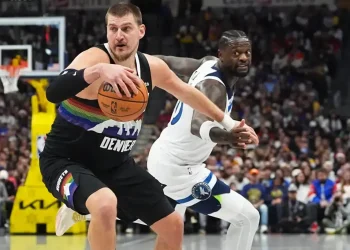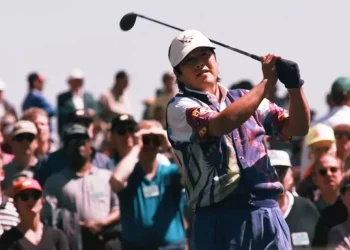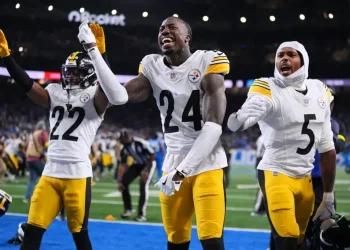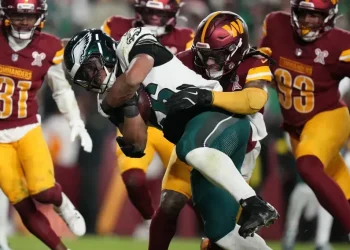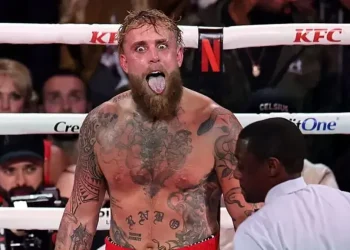Fernando Valenzuela, the impetus behind “Fernandomania” while winning National League Cy Young Award and Rookie of the Year honors in 1981 as the Los Angeles Dodgers won the World Series, has died at age 63.
The Dodgers announced the news, saying Valenzuela died Tuesday night at a Los Angeles hospital. They did not provide the cause or other details.
Valenzuela’s death comes as the Dodgers prepare to open the World Series on Friday night at home against the New York Yankees. Major League Baseball commissioner Rob Manfred said Valenzuela would be honored during the Series at Dodger Stadium.
After pitching in the majors for 17 seasons, Valenzuela served as a Spanish-language broadcaster for the Dodgers since 2003. He had stepped away from his broadcasting duties before the start of these playoffs to “focus on his health,” the team said.
Called up late in the 1980 season as a reliever, Valenzuela, who was born in Navojoa, Mexico, took the baseball world by storm in the strike-shortened 1981 season. After Jerry Reuss was injured on the eve of Opening Day, Dodgers manager Tommy Lasorda gave the ball to the 20-year-old Valenzuela, who had never started a major league game in his career.
He responded with a 2-0 victory over the Houston Astros and went on to begin the season with an 8-0 record, including five shutouts, and an 0.50 ERA.
“Tommy Lasorda came up to me and said, ‘Are you ready to pitch tomorrow?’ I said, ‘I’m ready,'” Valenzuela recalled in 2023. “That’s what I was looking for, the opportunity to show what I can do.”
In addition to his Mexican roots, Valenzuela’s pitching motion — the stout figure glancing skyward at the apex of each windup — was a hit. His signature pitch was the screwball, taught to him by teammate Bobby Castillo in 1979. During Valenzuela’s warmups, ABBA’s hit “Fernando” blared from the speakers. Latino fans turned out in large numbers — both at home and on the road — to see “El Toro,” the Bull.
Though Valenzuela has not been elected to the Baseball Hall of Fame, he remains a part of Cooperstown, which features several of his artifacts, including a signed ball from his no-hitter in 1990.
“His charisma was unbelievable,” Hall of Fame Dodgers Spanish-language announcer Jaime Jarrin said in 2023. “The fact that he came here to the major leagues [in September 1980] after spending just a few weeks in San Antonio at Double-A — and from the beginning, he was just amazing. And the people fell in love with him.”
“He was only 19 years old. Little bit chubby, long hair, Yaqui Indian features,” said Jarrin, who served as Valenzuela’s interpreter early in his career. “Those things really cultivated the people, and they fell in love with Fernando in a matter of a few weeks.”
Valenzuela finished the 1981 season with a 13-7 record, 2.48 ERA, 11 complete games and 8 shutouts. He led the National League with 192⅓ innings pitched and topped the majors with 180 strikeouts, becoming the first player to win Rookie of the Year and the Cy Young Award.
That season was the start of six straight All-Star appearances for the left-hander. Valenzuela finished third in Cy Young voting in 1982, fifth in 1985 and second in 1986 before a shoulder injury hindered him for the rest of his career. He won another World Series title with the Dodgers in 1988 (though he did not pitch in the postseason) as well as Silver Slugger awards in 1981 and 1983.
“He is one of the most influential Dodgers ever and belongs on the Mount Rushmore of franchise heroes,” Stan Kasten, president and CEO of the Dodgers, said in a statement. “He galvanized the fan base with the Fernandomania season of 1981 and has remained close to our hearts ever since, not only as a player but also as a broadcaster. He has left us all too soon. Our deepest condolences go out to his wife Linda and his family.”
Valenzuela pitched for the Dodgers from 1980 to 1990, including a no-hitter on June 29, 1990, that came in a 6-0 victory over the St. Louis Cardinals at Dodger Stadium. It was an emotional career highlight for Valenzuela, who struck out seven and walked three.
“If you have a sombrero, throw it to the sky!” Hall of Fame broadcaster Vin Scully exclaimed in his game call.
Form 1983 to 1987, Valenzuela averaged 262 innings pitched and 13 complete games for the Dodgers. He had a streak of 255 consecutive starts, which ended in August 1988. He registered 20 complete games in 1986, when he won a league-high 21 games and had a 3.14 ERA. He had 96 complete games in his first seven seasons.
He retired in 1997, and Valenzuela remains among the franchise leaders in wins (141), strikeouts (1,759), innings pitched (2,348⅔), starts (320), complete games (107) and shutouts (29).
Valenzuela’s rise from his tiny hometown of Etchohuaquila in the Mexican state of Sonora to stardom in the United States was improbable. He was the youngest child in a large family who tagged along when his older brothers played baseball.
He signed his first pro contract at age 16 and soon began overpowering older players in the Mexican Central League.
In 1978, legendary Dodgers scout Mike Brito was in Mexico to watch a shortstop when Valenzuela entered the game as a reliever. He immediately commanded Brito’s attention, and at age 18, Valenzuela signed with the Dodgers in 1979. He was sent to the California League that same year.
In 1980, Valenzuela was called up to the Dodgers in September and soon made his big league debut as a reliever.
Valenzuela’s rise from humble beginnings in Mexico and his feats on the mound made him hugely popular and influential in Los Angeles’ Latino community while helping attract new fans to MLB. Their fondness for him continued for years after his retirement.
“Fernando was an outstanding ambassador for baseball,” Manfred said in a statement Tuesday night. “He consistently supported the growth of the game through the World Baseball Classic and at MLB events across his home country. As a member of the Dodger broadcasting team for more than 20 years, Fernando helped to reach a new generation of fans and cultivate their love of the game.
“Fernando will always remain a beloved figure in Dodger history and a special source of pride for the millions of Latino fans he inspired.”
Valenzuela was unceremoniously released by the Dodgers in March 1991, days before the season started. He pitched for five other teams over the next seven seasons — the California Angels (1991), Baltimore Orioles (1993), Philadelphia Phillies (1994), San Diego Padres (1995-97) and the Cardinals (1997) — before retiring with a 173-153 record, 3.54 ERA and 2,074 strikeouts over 17 campaigns.
Six years after his playing career had ended — and 14 years after he threw his last pitch for the Dodgers — Valenzuela returned as a member of the Dodgers’ broadcast team in 2003.
The Dodgers, breaking from their tradition of only retiring the numbers of Hall of Famers, retired his No. 34 during a pregame ceremony at Dodger Stadium in August 2023. The number had been unofficially retired, and never worn by another player, since Valenzuela had been let go by the team 32 years earlier.
Valenzuela, who became a U.S. citizen in 2015, served on the coaching staff for Mexico during the World Baseball Classic in 2006, 2009, 2013 and 2017. He was a part owner of the Mexican League team Tigres de Quintana Roo, with son Fernando Jr. serving as team president and son Ricky serving as general manager. Fernando Jr. played in the San Diego Padres and Chicago White Sox organizations as a first baseman.
In addition to his sons, Valenzuela is survived by his wife, Linda, who was a schoolteacher from Mexico whom he married in 1981, and daughters Linda and Maria as well as seven grandchildren.
This article was rewritten by JournosNews.com based on verified reporting from trusted sources. The content has been independently reviewed, fact-checked, and edited for accuracy, neutrality, tone, and global readability in accordance with Google News and AdSense standards.
All opinions, quotes, or statements from contributors, experts, or sourced organizations do not necessarily reflect the views of JournosNews.com. JournosNews.com maintains full editorial independence from any external funders, sponsors, or organizations.
Stay informed with JournosNews.com — your trusted source for verified global reporting and in-depth analysis. Follow us on Google News, BlueSky, and X for real-time updates.
